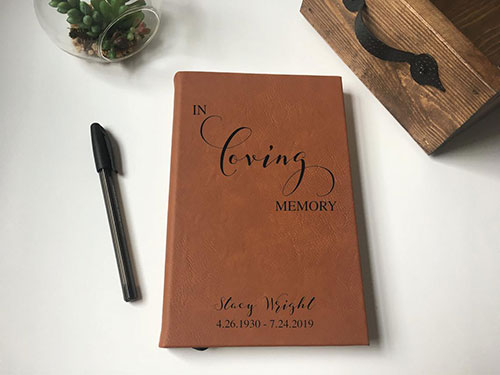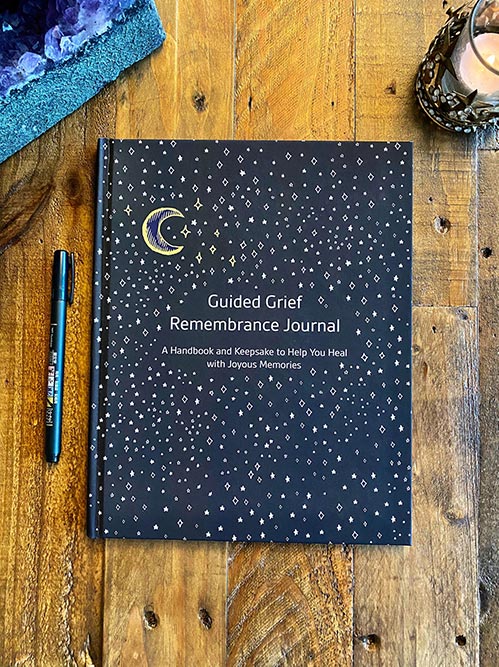Grief journaling offers an elementary yet surprisingly helpful way to cope with your bereavement.
All you need to do is grab a pen and paper and start writing.
Our website is supported by our users. We sometimes earn a commission when you click through the affiliate links on our website. See our privacy policy & disclosures for more information.
Journaling as Grief Therapy
Just grab pen and paper and start writing…
If only it were that easy. On one level it is – you’re simply picking up a pen and writing. But to get the most out of this process you will need to put in some good old fashioned effort.
Grief journaling as therapy requires dedication, motivation, and energy. It can be time-consuming and energy-draining. If you have experienced any form of therapy you know it can bring out some dormant feelings. Feelings you would rather not disturb.
Also, like any other therapy, journaling will get easier and make you feel better the more you do it.
Read on for valuable tips that will give you all the motivation you need to start writing! We’ll even close out with an assortment of grief journals and grief journaling prompts to get you going.
What is a Grief Journal?
“My bursting heart must find vent at my pen.” – Abigail Adams
A grief journal is used to write your most personal feelings. Keeping track of your emotions, thoughts, and struggles as you travel this journey that has been thrust upon you.
Urns Made in the USA
It can be a physical notebook or a digital document saved to the cloud. A grief journal can be more on the crafty side (like a scrapbook) or just plain writing. It can be an expensive, leather-bound and personalized heirloom journal, or a 99 cent notebook picked up in the office supply aisle at the grocery store.
It’s not the book, but what you put into it that counts.
Grief is one of the most powerful emotions you will ever go through. Sometimes it is a challenging emotion to discuss. By journaling about grief, you don’t have to worry about people “getting it.” You can write in short, straight forward entries or even in a mass of jumbled up words. The most important thing is to get your feelings out.
You are writing just for yourself, don’t worry about grammar or spelling. No one is going to judge you on your writing abilities.
10 Healing Benefits of Grief Journaling
Journaling can be a very effective way to help you work through the strong emotions of grief. Here are ten benefits.
1. Journaling can help you remember the good times.
During the grieving process, it can be hard to remember “good” things. Thinking of vacations, birthdays, and holidays is a great way to bring to mind the times you enjoyed together.
2. Journaling is safe and judgment-free.
Journaling is your own private thoughts. No one is going to see this but you. Whether your writings are sad, happy, or indifferent, it’s all just for you.
3. Journaling can improve your health.
Getting your emotions out can be good for your mental and physical health. As you express your feelings, benefits can include reduced stress, lower blood pressure, and better rest.
When you take charge of your thoughts in this way, journaling can help you in the healing process and may nip depression in the bud.
4. There might be days where you don’t feel like writing… and that is OK.
No one has made hard and fast rules when it comes to journaling. Maybe you would rather doodle, color, or create anything you feel like. This is your own private space.
5. Writing things down can make you aware.
Putting your thoughts into writing can make you more aware of what you are feeling. Self-reflection is deliberately paying attention to your own thoughts. This can help you to understand better the emotions roiling inside of you.
6. Use your journal to write about your daily accomplishments.
In the first stages of grief, you may find it difficult to get out of bed and brush your teeth. Then one day, you may find that it got a bit easier. Not only did you brush your teeth, but you got a shower in too.
Keep track of your accomplishments. Re-reading your journal every week will let you see the improvements you are making.
7. Journaling can improve your self-discipline.
Set a time to journal. No matter how busy you are, it will help you to stick to a schedule (but see #4 – it’s ok to have off days).
Research has shown that just before bed is the best time to journal. You can recap your day and get rid of all of the stress you may have encountered. It will also help you to relax and get better sleep.
8. Journaling can help you achieve your goals.
What are your goals, and how will you achieve them? Write them down and refer to your list often.
By keeping track of your goals, it is more likely you will attain them. Grief is disrupting, and staying on track will help you combat your grief.
9. Journaling can help improve your memory.
It is usually easier to remember something after you write it down. That’s why in school your teachers told you to take notes.
According to psychologists, your brain will remember the curvature of the letters, the color of the ink, and the mistakes you made while writing. All of this coming together will help you to remember better.
And remembering our loved ones is a very good thing.
10. Journaling can make you smarter.
Journaling will help you become more organized in your thought process. You will increase your vocabulary and your self-confidence.
Check for yourself. After journaling for a year, go back and read your entries. Chances are, you will see a big improvement in your writing skills and thought process.
40 Grief Journal Prompts
When you are grieving, it may be hard to even know where to start. You open up your grief journal and… what do you write?
Here is a helpful list of grief journal prompts.
- What is a positive memory of your loved one?
- What are some ways you can express your grief?
- Today you are happy/thankful for…
- If you could say anything to your loved one, what would it be?
- Today you remembered…
- What are issues, if any, that are unresolved?
- Make a list of some ways to honor your loved one.
- Who is your support system?
- When you’re overcome with grief, this is your new mantra…
- Here is how you can be compassionate towards yourself.
- Do you know anyone else that is grieving? If so, how do you show them compassion?
- The hardest time of day is…
- What do you miss about your loved one?
- You feel most connected to your loved one when…
- A comforting memory of your loved one is…
- What do you find helpful in your situation?
- How did your loved one make you feel?
- If you could be like your loved one in any way, what would it be?
- What you don’t want to remember. Write about something you wish you could forget.
- What is the nicest thing your loved one ever did for you?
- What do you want people to know about your loved one?
- Is anything keeping you up at night? If so, what?
- What is the one thing you wish you could change?
- Someday you hope you will feel like…
- How did you think grief would feel?
- How does grief feel?
- What do you want to remember? Write about the last time you were with your loved one.
- Write about the day you first met.
- What did they always do to make you laugh?
- Write about something only you know about.
- How did your loved one die?
- What were your loved one’s best qualities? Worst traits?
- Your grief triggers are…
- Why are you grieving?
- What season holds the most memories?
- It is hurtful when people do or say…
- The hardest part for you is…
- Do you have regrets? If so, what are they?
- What are your plans for the future?
- What is the one thing you learned from your loved one?
Does writing in a journal help with grief?
Research has shown that keeping a grief journal helps immensely. Writing about your feelings may trigger deep emotions, but many people report feeling better later on.
Working through your grief is crucial in your healing process.
Is writing about grief a form of therapy?
According to professionals, grief journaling is a form of therapy. Journaling may make you cry and become upset, but that is how to push through these feelings. This is a great way to let these emotions out and help you advance towards healing.
Many psychologists, such as James W. Pennebaker, Ph.D. in his book Writing to Heal: A Guided Journal for Recovering From Trauma and Emotional Upheaval, recommend journaling. Journaling helps you gain control of your emotions and improve your mental well-being.
How do you start a grief journal?
Numbness and feelings of depression are normal after the loss of a loved one. Keeping a grief journal is a healthy way to express your feelings and emotions.
- Get yourself a journal, pens, colored pencils, stickers, or whatever you would like to use. It doesn’t need to be anything fancy. It is your own personal space.
- Make a schedule. It can be daily, weekly, or whenever you “need” to write.
- Designate a writing space for yourself.
- Find your inspiration/prompts. Be creative.
- Re-read your journal from time to time.
That’s it! The hardest part is also the easiest: “Just” pick up that pen and paper and start writing.
Our Favorite Grief Journals
1. Personalized Memorial Journal

This faux leather Personalized Memorial Journal features laser etching of your loved one’s name and dates. It includes a beautiful sympathy quote and over 100 pages of lined paper. You can also use this as the funeral guest book.
2. Angel Catcher Remembrance & Grief Journal
This popular remembrance journal has been in print for over a decade. It’s filled with prompts, quotes, poems, and even provides space for photos and keepsakes in an envelope sleeve attached to the back. The goal of the journal is to really help you honor the memory of your beloved “angel.”
3. My Therapist Told Me to Journal
This quirky mental health journal isn’t about grief per se, but it will guide you into healthy habits and thinking by using a more creative approach. This one includes serious and silly prompts, activities and exercises, and even some fun stickers to use throughout the journal.
4. Guided Grief Remembrance Journal

This guided grief journal is designed and produced by an independent author in Pennsylvania. Here’s the inspiration:
I decided to create this journal to help guide myself and my family through happy memories of my mother and other family members who have passed. I wanted to have a way to memorialize and share the special, positive emotions and memories with those who loved my mother and those who would have if they had a chance to meet her, like my daughter.
It’s an uplifting resource for me to reference when I’m feeling sad that she has crossed to the other side. I also use it as part of my healing and gratitude practice to remind myself of how lucky I was to have such an amazing mother.
Lauren Stephan Cohen
5. The Memory Book: A Grief Journal for Children & Families
Here is a book designed to guide young children and their families through the process of grief journaling. Joanna Rowland’s The Memory Book features prompts to help young ones talk about their emotions, questions and activities that promote healthy grief and healing, and even art prompts for drawing and other forms of self-expression.
It’s based on a highly regarded children’s picture book by the same author, The Memory Book: A Book About Grief. That would be an excellent companion piece, for your own family or to give as a sympathy gift.
More Grief Resources
- Normal Grief: 10 Things to Know About the Grieving Process
- 101 Classic Books for Children About Death, Grief, Pet Loss & More
- Mourning a Death: How to Grieve Well
- Grief Quotes: 100+ Illuminating Quotes When Grieving a Loss









My son was murdered 13 years ago and soon after that I started writing in my journal
I had no idea what to write about so I started writing like I was talking to him and like he was in the same room with me just like I use to talk to him I would tell him that I had made his favorite food and what I had done that day
And the times that my husband and I would go on a vacation rather it be just a weekend getaway or longer and we would go to his favorite places that we had all been together I would tell him everything about it
When it snowed I would write and tell him about it because he loved the snow
My son was murdered 13 years ago and soon after that I started writing in my journal
I had no idea what to write about so I started writing like I was talking to him and like he was in the same room with me just like I use to talk to him I would tell him that I had made his favorite food and what I had done that day
And the times that my husband and I would go on a vacation rather it be just a weekend getaway or longer and we would go to his favorite places that we had all been together I would tell him everything about it
When it snowed I would write and tell him about it because he loved the snow